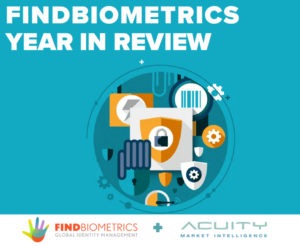Welcome to FindBiometrics’ digest of identity industry news. Here’s what you need to know about the world of digital identity and biometrics today:
Scottish Police Get Official ‘Code of Practice’ for Biometrics
Scotland’s ‘Code of Practice’ concerning the police use of biometric data has now come into effect. The framework revolves around principles including privacy, respect for human rights, equality, and ethical concerns, with the Scottish Police Authority, Police Scotland, and the Police Investigations and Review Commissioner required to adhere to its guidelines. “From today, Scotland is the first country in the world to have a national code of practice which gives guidance to the police on how biometric data and related forensic technologies can be used,” proclaimed Scottish Biometrics Commissioner Brian Plastow, who submitted his draft of the code to Parliament this past June.
Amazon Trials Selfie Onboarding for Sellers
Amazon has begun testing a selfie onboarding system for its selling partners that uses facial recognition to match them to images of their official identity documents. But the company is taking a cautious approach, explaining in a blog post that the pilot will entail manual reviews of the automated system’s decisions. If all goes well, a fully automated system will eventually be rolled out. “Our test will determine whether we can achieve the same robustness of identity verification as our current processes while also providing a better experience for sellers who choose this verification process,” the company explained.
Ping Adds Another Biometric Onboarding Specialist to DaVinci Platform
AuthenticID’s selfie onboarding solution has been added to Ping Identity’s PingOne DaVinci ‘identity orchestration’ platform. AuthenticID’s solution is designed to read photos of identity documents, and to use facial recognition to match them to end users’ selfie images. A similar solution developed by 1Kosmos was integrated into PingOne DaVinci last month. “Ping Identity is committed to expanding our technology partner ecosystem to deliver better, more frictionless customer experiences,” explained Ping’s SVP of Product Management, Loren Russon, in the latest announcement.
IDEX Gets $2M Order From Partner IDEMIA
IDEX has received its largest order to date for its TrustedBio fingerprint sensor solution for smart card and payment cards. Representing approximately $2 million in revenues for the company, the order is from its partner IDEMIA, and will see shipments of TrustedBio sensors in the first quarter of next year. The announcement comes after a Q3 update in which IDEX reported revenues of $928k, though the company also asserted that its executives had “a clear roadmap and a path to commercial acceleration during 2023 and beyond.”
FindBiometrics Teams With Acuity on Year in Review
FindBiometrics has partnered with Acuity Market Intelligence for the latest Year in Review Survey. Renowned for its insights and accurate forecasting with respect to identity and biometric technologies, Acuity is poised to provide valuable analysis alongside FindBiometrics editors as the organizations seek to uncover the most important trends and insights from the industry’s most comprehensive and long-running internal survey.
Partnerships Fuel Health-focused Wearables Progress
Vivalink has announced that its Biometrics Data Platform is now collecting physiological data from a range of wearable devices from companies including Roche, Garmin, and Omron; and the platform is available for use in support of clinical trials and other healthcare projects. “Ultimately, access to data-based insights provides researchers and physicians with better information to improve patient care and breakthrough therapies,” explained Vivalink CEO Jiang Li. “This integration allows our customers to rapidly implement remote patient monitoring applications using optimized fit-for-purpose wearables and devices in a cost-effective way.”
Parker Health will offer Cipher Skin’s biometric wearables to clinics using its Parker Suite Health Management System. The pilot program will begin with select orthopedic clinics cross Austin, Kansas City, Los Angeles, and San Francisco, and will see Cipher Skin Biosleeve devices offered to Medicare and Medicaid patients. The Biosleeve is designed to capture motion and biometric data, and organizers of the pilot will explore its utility in helping patients to improve their health through physical therapy exercises.
iDenfy Provides AML Services for Polish Payment Kiosks
IboxPay, a provider of specialized payment terminals in Poland, has opted to use iDenfy technology for Anti-Money Laundering compliance. IboxPay operates a network of kiosks that let customers pay their bills via cash – a common practice in Ukraine, where IboxPay got its start, that the company is now looking to deliver to Poland’s many Ukrainian residents and to interested Poles. The company is using iDenfy’s technology to screen its customers against government watch lists.
Lumin Partnership Brings BioCatch Tech to Baxter Credit Union
Baxter Credit Union will use behavioral biometrics technology from BioCatch to help fight fraud. The move is the result of BCU’s partnership with Lumin Digital, an IT consultancy that agreed to offer BioCatch’s solution to its network last month. “This partnership with BioCatch via Lumin gives us the tools we need to stop attacks in real-time and ensure our members and employees can work together in a safe and secure system,” said the Senior Director of BCU’s Account Protection Team, Stacy Bausch.
Vintra Launches Biometric Access Control Tool
Vintra has launched a new biometric access control tool for its Vintra Prevent security platform. Dubbed Vintra Guard, the video-based system is designed for use with the C•CURE 9000 Security + Event Management System, and can automatically review access events at a selected point of entry, using facial recognition to match each individual accessing a facility to the badge that they are using. If the system detects an individual using a badge that is not assigned to them, it will trigger an automated security alert.
New Airport Biometrics Deployments from CLEAR, British Airways, Air New Zealand
British Airways will trial a biometric boarding system that lets participants upload their passports, boarding passes, and selfie photos remotely using a smartphone or tablet ahead of their travel date, and then proceed through London Heathrow Terminal 5 on the day of travel without having to show their documentation. The trial will run for six months, and will be restricted to volunteers traveling to Malaga, Spain. Amadeus has provided the biometric screening technology to be used in the pilot.
CLEAR has brought its expedited passenger screening system to Boise Airport in Idaho. It’s the latest step in the nationwide expansion of CLEAR’s service, which lets registrants take advantage of faster airport screening through iris and fingerprint scans. “We are pleased to welcome CLEAR at our expanded security checkpoint today—right in time for the busy holiday travel season!” commented Boise Airport Director Rebecca Hupp.
Air New Zealand has successfully trialed a biometric boarding system at the Los Angeles Airport, and said it will next deploy the system at the San Francisco International Airport. The system is based on facial recognition, and is the result of a collaboration with US Customs and Border Protection. In announcing the development, Air New Zealand Chief Digital Officer Nihil Ravishankar framed it as a response to demand, saying that customers want technologies that can make the air travel experience “hassle-free”.
Trinamix Tailors In-display Face Scanning Tech for Snapdragon
Germany’s Trinamix has optimized its technology for Qualcomm Snapdragon processors, and demoed the solution at this month’s Qualcomm Snapdragon Summit in Maui, via a mockup using the Snapdragon 8 Gen 2 Reference Design. Trinamix first unveiled its in-display facial recognition system for OLED screens, developed in partnership with STMicroelectronics, this past April. Its relationship with Qualcomm, whose Snapdragon processors are widely used across a number of mobile devices, could lead to numerous integrations. Qualcomm Director of Product Management Asaf Shen commented that his company has “made data security an integral part of our mobile platform – which makes our work with Trinamix essential.”
–
November 16, 2022 – by Alex Perala











Follow Us